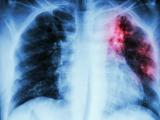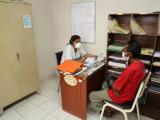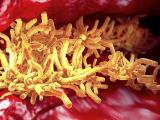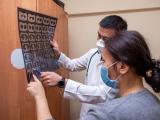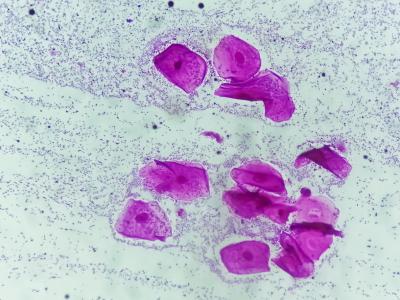Feb 1, 2006 (CIDRAP News) Minnesota cattlemen are facing an economic blow from a once-banished nemesis: bovine tuberculosis.
The Minnesota Board of Animal Health (BAH) announced on Dec 8 that the USDA would drop the state's TB status a notch, from TB-free to "Modified Accredited Advanced." The reduction in status took effect Jan 30.
With the change come more restrictions on cattle sales across state lines, BAH said in a news release Jan 30. USDA requires all sexually intact cattle to be tested for bovine TB within two months of shipment. Certain cattle are exempt from testing, including those crossing state boundaries directly to slaughter, those going to an approved feedlot, and those from a TB-accredited herd. State rules for shipping cattle vary, so producers must contact destination states for details.
Minnesota cattle producers who plan to ship cattle to other states must follow both federal and state testing rules. With few exceptions, farmers must pay for the testing.
"This is not a food issue," said Minnesota Agriculture Commissioner Gene Hugoson, as quoted in a Minneapolis Star Tribune newspaper story yesterday. "This is really an economics issue for cow producers."
Minnesota had been deemed free of bovine TB from 1976 until the discovery of the disease in a cow from a Roseau, Minn., herd in February 2005 prompted an investigation, according to the BAH. Since then the state has quarantined 65 herds for bovine TB. Tests on 39 of the herds showed no sign of infection, prompting their removal from quarantine. Twenty-six herds remain under quarantine today.
Cattle from the five herds found to be infected have been culled, BAH said. The USDA has paid for the killing of almost 4,000 cattle from those five herds; federal money also has been used to pay for removal of 180 exposed cattle.
"The state can apply for TB-free status 2 years after the last infected herd is depopulated, so it's vital that we expedite depopulation of any infected herds," said Bill Hartmann, state veterinarian and executive director of the BAH.
Besides Minnesota, states currently classified as other than free of bovine TB are Michigan, New Mexico, and Texas, according to the USDA's Animal and Plant Health Inspection Service (APHIS).
Mycobacterium bovis causes bovine TB, which is a respiratory disease of cattle, according to the BAH. It is a chronic, slowly progressive disease but does not spread easily. Infected cattle may transmit an infection to other animals, even when they appear asymptomatic. Bovine TB can affect all warm-blooded vertebrates, according to APHIS.
Pasteurization of milk and improved inspection and hygiene virtually eliminated human illness cases linked with bovine TB. However, a series of 35 human cases in New York City prompted the federal government last year to warn against eating soft cheeses made from raw milk.
The Minnesota BAH, in conjunction with APHIS, is offering free bovine TB testing to farms within 15 miles of an infected herd. However, the recent downgrade in status affects all Minnesota farmers, which means many will have to pay for testing on their own.
State and federal officials are also testing wild deer, according to a story in the Grand Forks (N.D.) Herald. A deer shot by a hunter last fall near the site of the first infected herd was found to have TB. State officials haven't determined if that case is a harbinger of a larger outbreak among deer, the paper said.
See also
APHIS information about bovine tuberculosis
http://www.aphis.usda.gov/newsroom/hot_issues/bovine_tuberculosis/bovine_tb.shtml
Mar 17, 2005, CIDRAP News story "Raw-milk cheese implicated in 35 TB cases"

